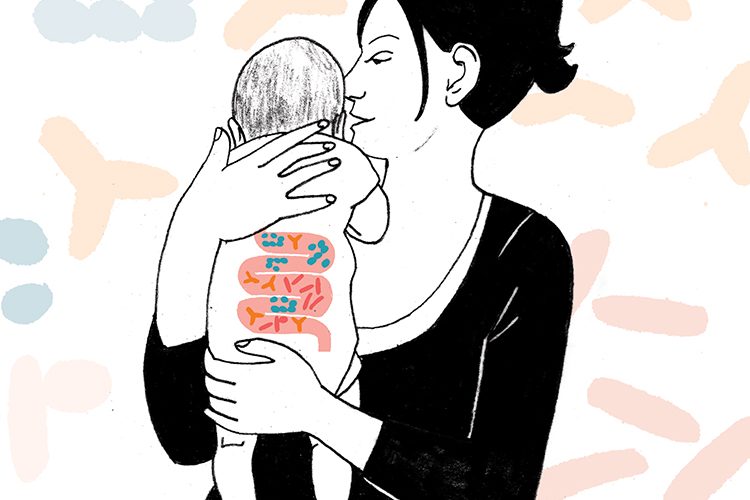Robin Flannery ’02 is taking a closer look at the benefits of probiotics for babies.
For Robin (Pedersen) Flannery ’02, the term “gut check” has taken on a whole new meaning in her biomedical science career.
As director, clinical development and operations for Evolve Biosystems, Flannery is on the leading edge of a nascent field: the study of the infant gut microbiome and how its bacterial composition affects a child’s overall health. She organizes and executes Evolve’s clinical trials that look at how the bacterium B. infantis — a species that uniquely consumes indigestible sugars in breast milk — can enable babies to better utilize nutrients
and, it’s theorized, strengthen their immune systems.
“Infants who do not have B. infantis in their gut microbiome will have a higher gut pH, which allows pathogenic (disease-causing) bacteria to thrive,” Flannery explains. “These pathogenic bacteria, along with the disappearance of B. infantis, are linked to health issues such as diabetes, asthma, eczema, allergies, and obesity, all of which have been on the rise in our population.”
The gut microbiome also interacts significantly with the immune system. If the wrong bacteria are involved in those interactions early in life, it can lead to aberrant immune system development and autoimmune disorders.
If a baby is delivered by cesarean section, fed formula, or prescribed antibiotics, they are less likely to have B. infantis in their gut microbiome. “We’re working to develop probiotic products to establish, restore, and maintain the infant gut to what nature intended,” Flannery says.
With funding from the Bill and Melinda Gates Foundation, she is coordinating a trial in Bangladesh that provides a B. infantis supplement in powder form to 75 malnourished infants. “They have a very different gut microbiome than healthy, age-matched controls,” she says. “We hypothesize that, by supplementing them with B. infantis and providing the proper nutrients, the infants will grow better and have improved health outcomes.”
In partnership with King’s College in London, Flannery has launched a trial of the powdered supplement for cesarean-delivered infants that examines how their immune systems develop compared to babies given a placebo. And in Florida, she’s running a study of an oil-based supplement for preterm infants in one of the nation’s largest neonatal intensive care units.
It was after a career gut check that Flannery pivoted into clinical trial development. She had spent five years conducting traditional laboratory “bench science” — such as DNA extraction and cell-based assays — for Boston-area companies ranging from a small start-up to pharmaceutical giant Novartis. But, “I felt too far removed from the translation of that exciting science to patients,” she says.
Flannery honed her clinical trial development skills at Osiris Therapeutics, where she was on the clinical team that developed the world’s first FDA-approved stem-cell drug. The experience left no doubt that Flannery had found the “Goldilocks niche” that best matched her skills and interests. “Clinical trial work is so multifaceted,” she says. “I work with regulatory agencies. I coordinate the teams manufacturing the product. I’m responsible for all of the required documentation. I have to be organized for everything that’s happening at once.”
Since joining Evolve in 2016, Flannery acknowledges that her daily conversations have taken a turn she didn’t envision. “I never thought I’d spend so much time talking about poop and breast milk,” she jokes. “But being in this position, and doing this work, is really where I’ve always wanted to be.”

